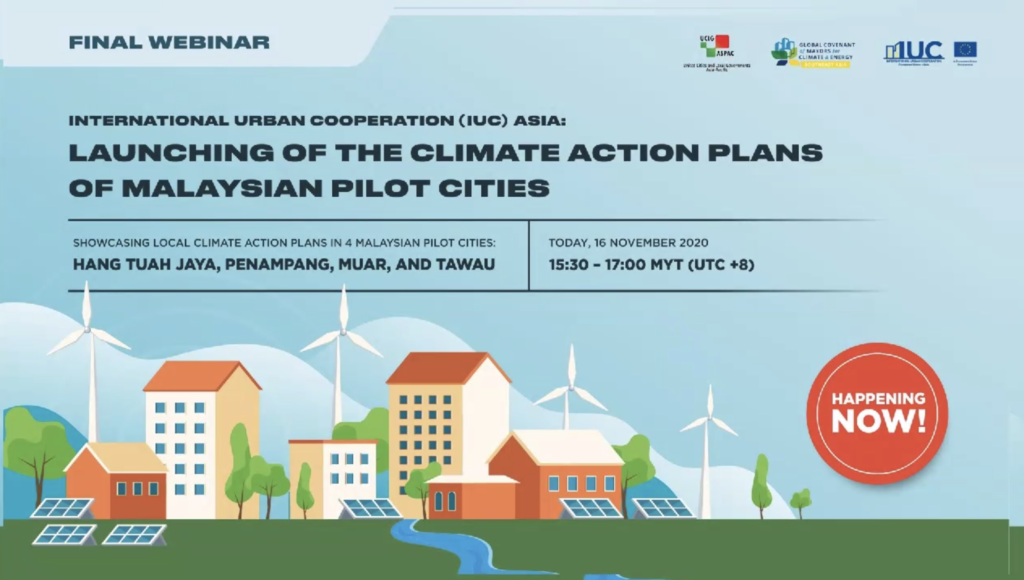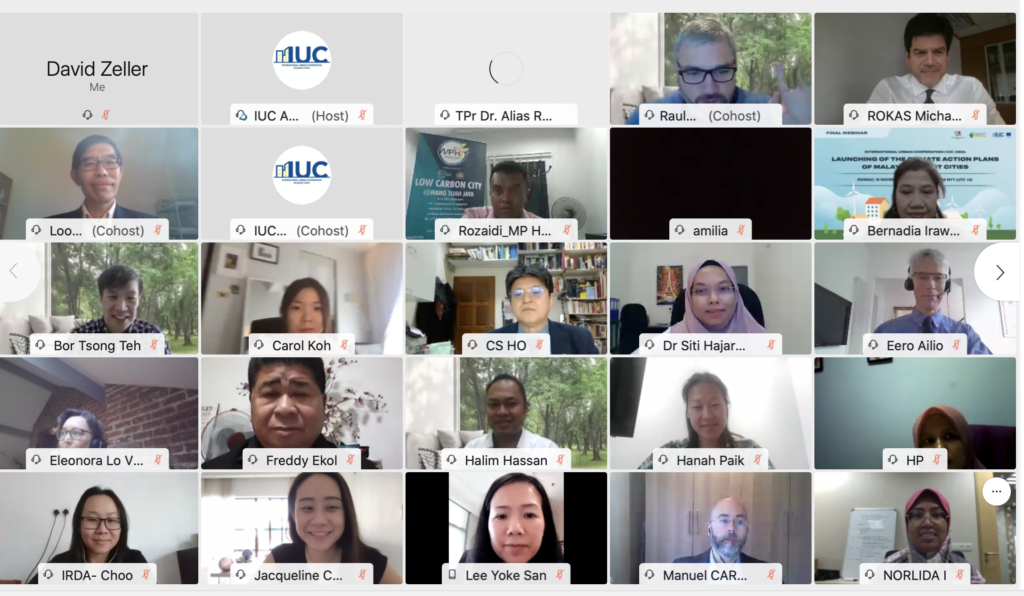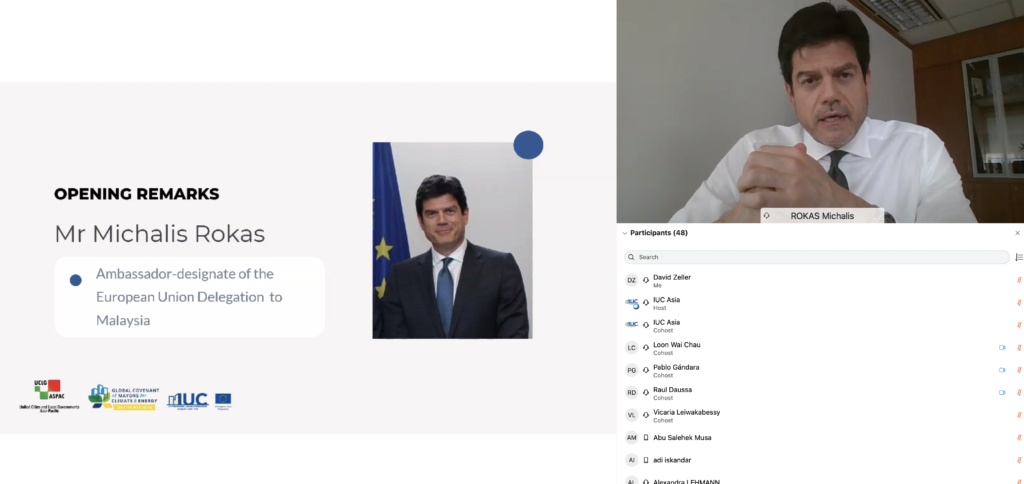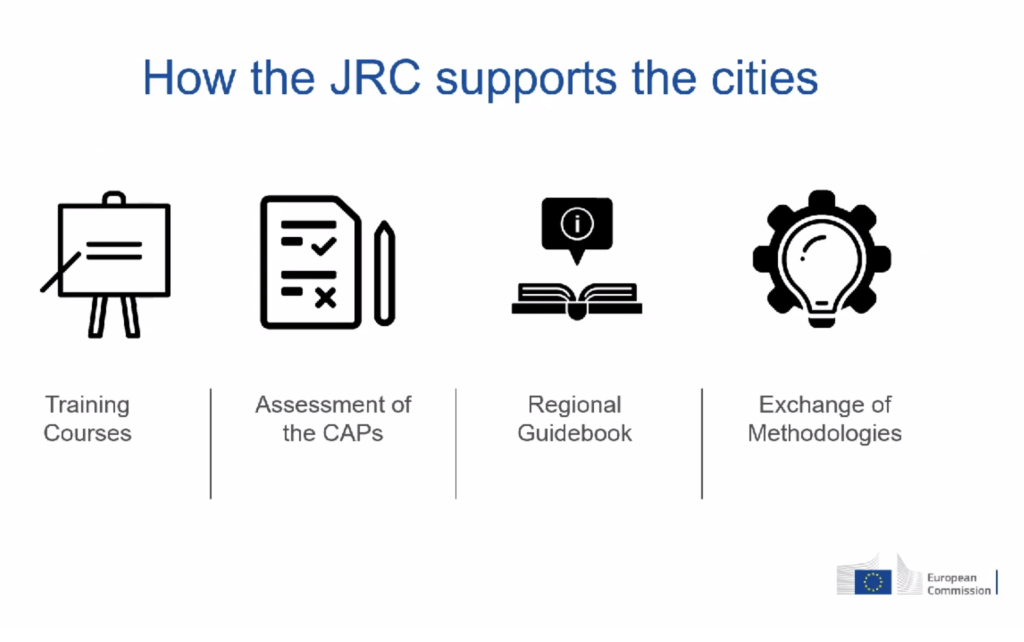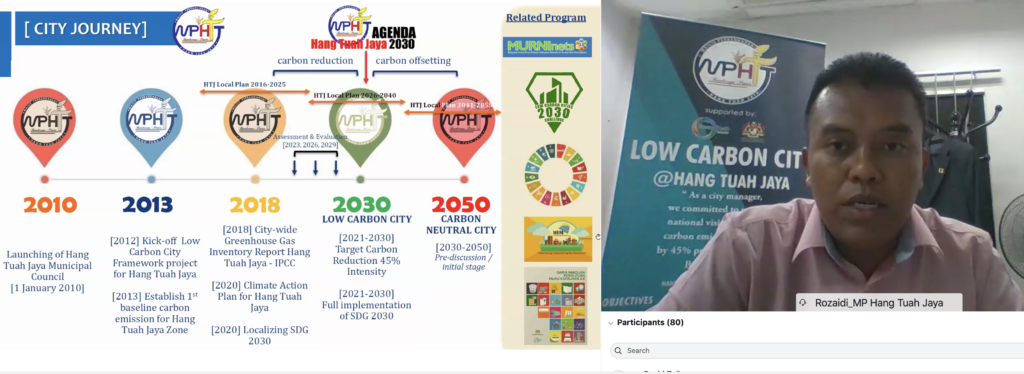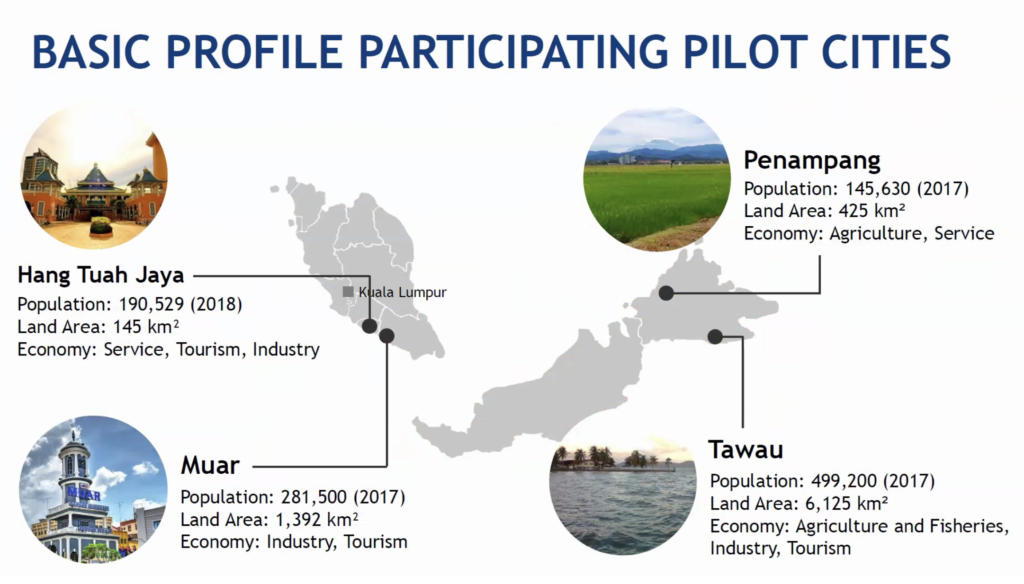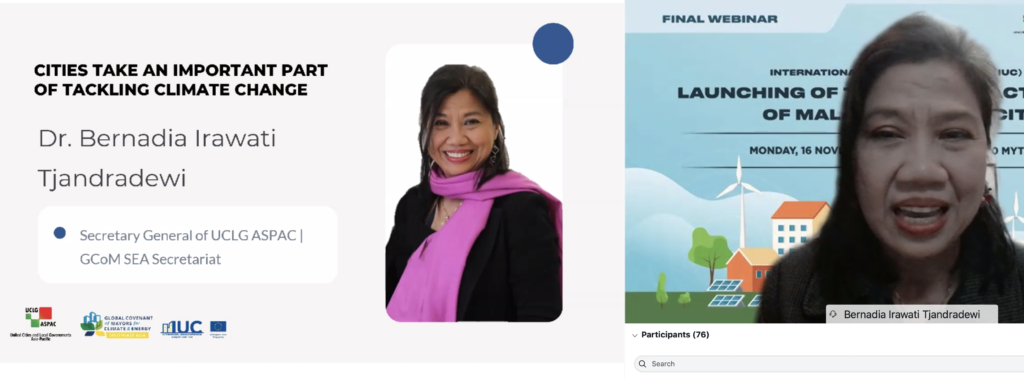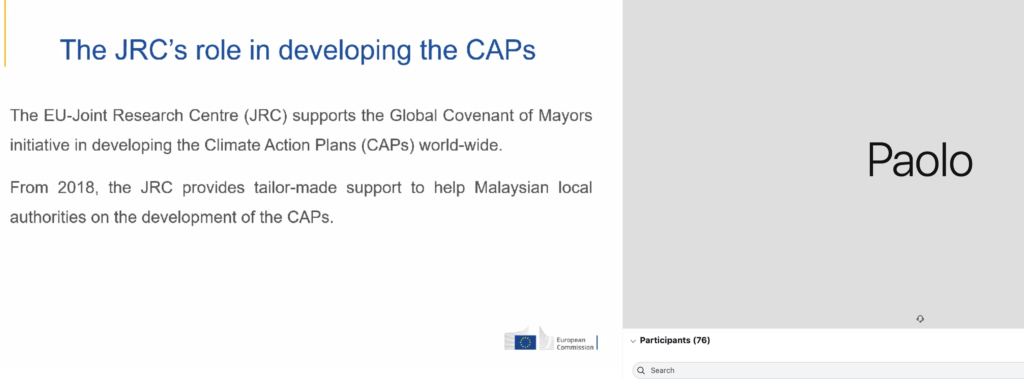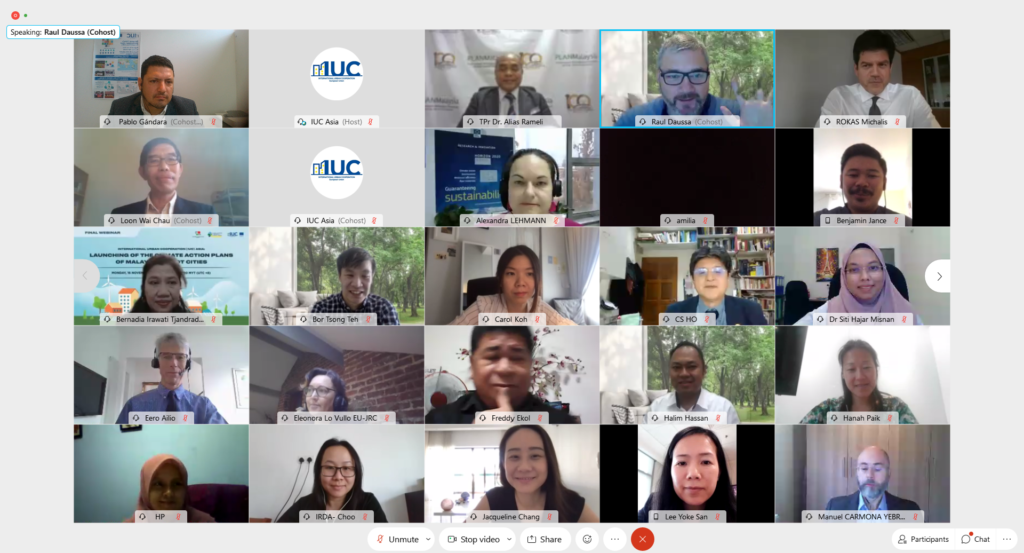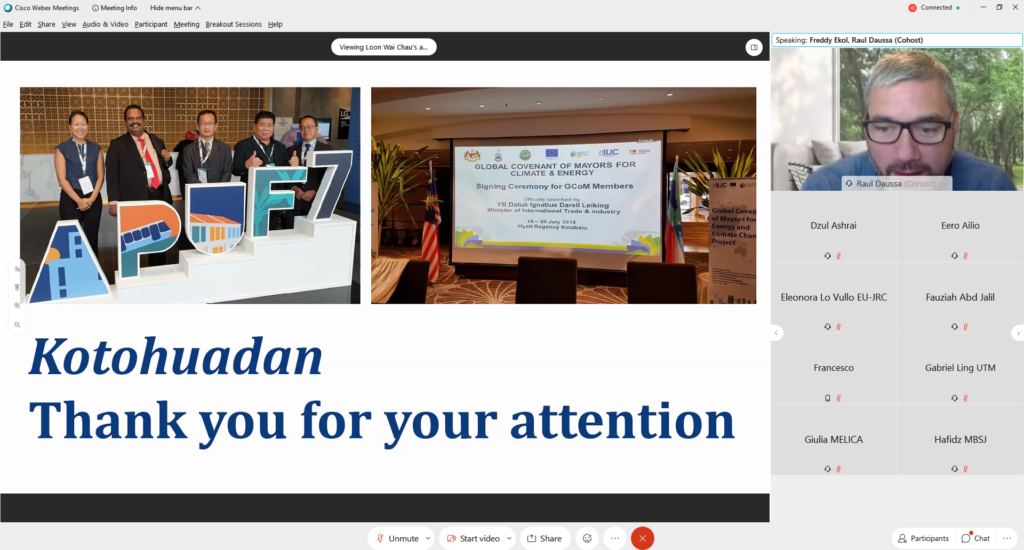Today the IUC-Asia held its final webinar on technical assistance of Climate Action Plans (CAPs) development in 4 pilot cities in Malaysia, consisting of Penampang, Tawau, Muar and Hang Tuah Jaya. The meeting was a chance to present the final products (CAPs) and discuss the lessons learned during the process between the Directorates-General of the European Commission (CLIMA/ENER/JRC), the Service for Foreign Policy Instruments (FPI), the EU Delegation to Malaysia, the Global Covenant of Mayors (GCoM) Secretariat and IUC’s technical partners working in the region, namely UTM and CDP. The event was moderated by Raul Daussa, Lead Expert for Cities and Climate of the IUC Asia project.
The results of a mid-term monitoring webinar were also reviewed, identifying emerging needs and challenges for future EU cooperation policies and actions in each country. The technical support given to the pilot cities is comprised of step-by-step training and knowledge sharing on how to develop each essential component of a CAP, namely baseline GHG emissions inventory, target setting, climate risk and vulnerability assessment (CRVA), monitoring/verification, and climate finance options/implementation. The CAPs are expected to be accomplished by the end of IUC Asia programme and become references for replication in other GCoM cities, continuing into the subsequent IURC programme.
The online meeting was moderated by Raul Daussa (IUC-Asia) with 80 participants and began with opening remarks by H.E. Michalis Rokas, Ambassador-Designate of the European Union Delegation to Malaysia. “By the year 2030, if the actions identified are indeed implemented in the 4 pilot cities, the projected CO2 emissions reduction would amount to 5,589 MtCO2eq. This potential reduction amount is equivalent to 1.2 million cars being taken off the road for a year, or 92.4 million tree seedlings grown for 10 years, or 1,200 wind turbines running for a year.”
Dr. Alias bin Rameli, Dir. R&D Division of PLANMalaysia, Ministry of Housing and Local Government provided further welcome remarks during today’s webinar, stating “I would like to express my deepest gratitude to GCoM and IUC Asia for accelerating the preparation of Climate Action Plans in Malaysia.”
From the EU Commission Directorates, Manuel Carmona Yebra of DG CLIMA, and Eero Ailio of DG ENER discussed how EU climate and energy cooperation can be a driver to combat global challenges. Mr Carmona acknowledged the good work done by the IUC project regarding the technical assistance on Malaysian pilot city CAPs. Mr Ailio noted the importance of developing a holistic approach for solving climate change issues, thus involving partners from public authorities, research, companies and civil society (quadruple helix). As a reference, Mr Ailio referred to the European Climate Pact, part of the EU’s Green Deal, which offers a good framework to involve stakeholders in climate action. He also emphasized the importance of the bilateral EU energy/climate dialogues with Malaysia and the involvement of provincial authorities in the GCoM governance structure.
Key messages and lessons learned from developing Climate Action Plans in Malaysia were presented by Prof. Ho Chin Siong, Mr. Chau Loon Wai of Universiti Teknologi Malaysia–Low Carbon Asia Research Centre (UTM-LCARC) and Hanah Paik of Carbon Disclosure Project (CDP). Malaysia intends to reduce its greenhouse gas (GHG) emissions intensity of GDP by 45% by 2030 relative to the emissions intensity of GDP in 2005. Prof. Ho Chin Siong noted, “The IUC Asia supported pilot cities in achieving Paris Agreement and SDGs in Mainstreaming climate action initiatives into respective development plan, capacity building, benchmarking using CRF and creating opportunities for city-to-city collaboration. PLANMalaysia is looking to have climate actions incorporated into development plans in Malaysia, ensuring vertical integration of climate action. Once incorporated, the climate actions become statutorily binding on all development activities and projects in the cities.“
Results of each of the 4 pilot cities, regarding their respective Climate Action Plans were given by respective city officials (with reports under the Presentations heading below):
- Muhammad Ali Tukiman, Director, Building Department, Muar Municipal Council (MPM)
- Freddy Ekol – Councillor, Penampang District Council (MDPg)
- Muhammad Ikhsan Wahap – Engineer, Development and Engineering Division, Tawau Municipal Council (MPT)
- Rozaidi Mahat – Head, Green Unit, Hang Tuah Jaya Municipal Council (MPHTJ)
Dr. Bernadia Irawati Tjandradewi – Secretary General of UCLG ASPAC / GCoM SEA Secretariat, emphasized the IUC Asia introduced some of the most cutting-edge technological innovations & financing initiatives to help with the transition to circular economy.”
Paolo Bertoldi from the EU’s Joint Research Centre (JRC) reiterated its commitment to provide feedback to the CAPs and explained the technical support provided to cities across the globe, especially with regard to creating partnerships with local utilities companies to gather accurate data on transportation and energy consumption.
IUC Asia Team Leader Pablo Gándara summarised the IUC cooperation with Malaysia since 2017, added final words, thanking the participants and closed the session.
Agenda
IUC Asia – CAPs Final Webinar Malaysia 16 Nov (Agenda)
Presentations
Dr Alias bin Rameli PLANMalaysia for IUC webinar
20201116_Final Workshop_Muar
20201116_Final Presentation_Hang Tuah Jaya City
20201116_Final Workshop_Penampang
20201116_Final Workshop_Tawau
20201116_Malaysian Pilot Cities_UTM & CDP
Impressions
